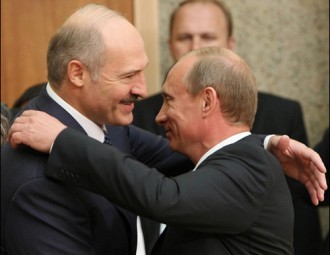In 2015 Kremlin hopes to take control over Belarus’ customs in exchange for financial aid

Ahead of 2015 president election, Belarus’ dependence on financial aid from Kremlin has only increased, which means that it might make some concessions within the EAEC integration on Russia’s terms.
In 2015, in the view of the presidential elections, the Kremlin hopes to take control over Belarus’ customs border in exchange for financial aid. Belarus is ready to make some concessions to the Kremlin – such as accepting payments in Russian rubles for Russian energy. In the medium term, however, it has no plans either to delegate the authority to control Belarus’ western borders to supranational bodies, or to endorse the introduction of the single currency in the Eurasian Economic Union.
A Meeting of presidents of Belarus, Russia and Kazakhstan in Astana, which was planned for last week, had been postponed. Reuters quoted a source in the Kazakh government as saying that “the visit was cancelled, apparently Putin has been taken ill”. At the trilateral meeting in Astana, the presidents planned to discuss trilateral trade and economic cooperation issues, current trends in the global economy, as well as the situation in Ukraine. Interestingly, the president of Armenia, the EAEC Member State as of January 2nd, 2015, was not reported to participate in the meeting.
The Kremlin counts on dictating terms for Belarus to delegate some national authority in customs control to supranational bodies – de facto to Moscow. Formally, Russia has justified her requirements by referring to insufficient control by Belarus over her border with the EU and allowing food imports to Russia regardless of the Russian food embargo. The Russian Food Administration Agency has toughened control over food originating or transiting through Belarus. The RFAA reported that since early 2015 the volume of smuggled foodstuffs to Russia via Belarus had doubled compared with 2014. The RFAA also proposed to examine farms in Belarus producing beets, carrots, apples and milk, as well as food suppliers, which had fallen under suspicion for re-exporting food from the EU.
Belarus’ Agriculture Ministry has once again rejected the Russian authorities’ proposal to organise a joint monitoring of the Belarus-EU border and proposed to organise a joint monitoring of all borders of the Customs Union, including Russian and Kazah sites. In addition, a member of the board for Customs Cooperation at the Eurasian Economic Commission Goshin said that a single system of electronic document circulation in the customs sphere of the EAEC would be introduced by 2021.
Meanwhile, at recent Supreme Council of the Unions State of Belarus and Russia meeting, presidents Putin and Lukashenka signed the inter-governmental agreement on the exchange of data regarding entry and exit bans issued by both countries. In addition, President Putin underscored that there was an agreement “to continue to work on the common visa space”. The Belarusian president, however, gave no encouragement to this initiative by his Russian counterpart.
President Putin has requested the Government and the Central Bank, together with the central banks of Belarus, Kazakhstan and Armenia to look into possibilities to create a monetary union within the EAEC – by September 1st, 2015. Meanwhile, Belarus’ Council of the Republic Chairman Mikhail Miasnikovich proposed speed up the creation of the monetary union: “Monetary union is one of the last integration phases. We believe that the date envisaged by the EAEC founding treaty – i.e. 2024 – is too late. When there is no sufficient stability on the financial markets, indeed, we need to prepone the date and consider a single payment system, as well as increase the share of national currencies in mutual settlements".
Belarus and Russia largely trade in Russian and Belarusian rubles. Belarus’ interest is to make all settlements with Russian energy suppliers in Russian rubles, while normally those are made in US Dollars (electricity, oil) or tied to the US Dollar (gas). In addition, since Russia has reduced financial capacities, Belarus is ready to receive financial support in Russian rubles. Apart from Belarus, Russian and Kazakh officials have confirmed their willingness to make settlements for energy resources in Russian rubles. Nevertheless, Belarus is not interested in the single currency within the EAEC, which has been repeatedly underscored by her senior management.
Ahead of the 2015 presidential campaign, Belarus’ dependence on the financial aid from the Kremlin has only increased, which means that it might make some concessions within the EAEC integration on Russia’s terms.
Originally published at Solidarity with Belarus Information Office
-
03.01
-
07.10
-
22.09
-
17.08
-
12.08
-
30.09








































